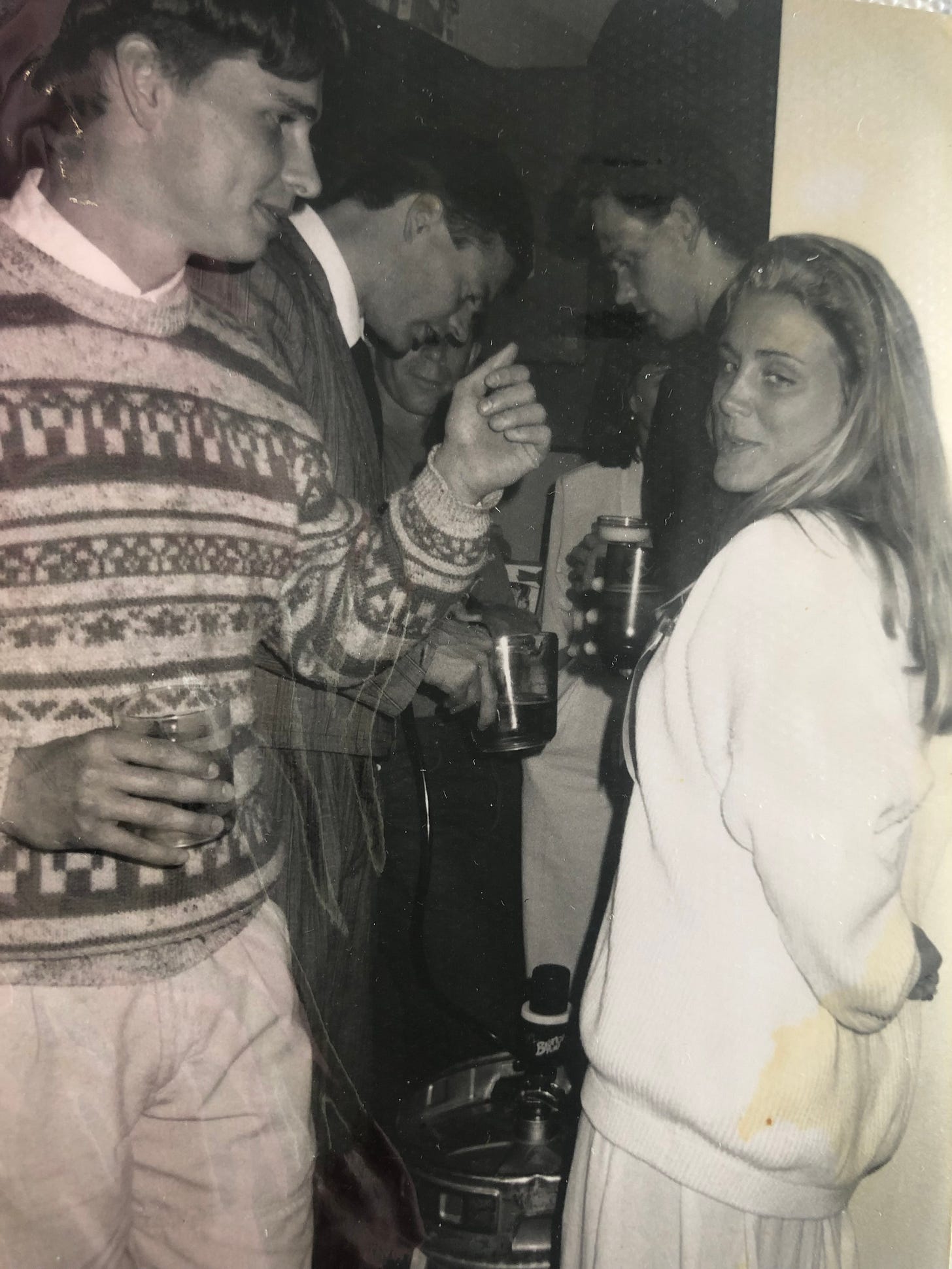Red red wine: nostalgia on an Oregon J-School amie as Mardi Gras nears
Do French heighten the moment differently than Italians? That’s up to debate. Stay tuned for Part Two.
“I could drink bottles and bottles of champagne.”—Marie-Pierre Morissette, UO journalism student
Lunch with Marie-Pierre Morissette and family in Poitiers, France, June 1990
It was a simple write-up. “Interview the person beside you and find out what makes them tick,” instructed the Oregon professor.
The French girl rarely spoke in the senior-level class on reporting, but she’d been spotted along 13th Avenue, somewhere past the Bijou cinema discretely pecking at a cigarette, her only company. Soft smoke plumes vaporized into pitter-patter noir fit for Poitiers, her homeland.
She wore loose-fitting black and grey as well as high-top brown leather shoes, the kind of apparel that loses a foreigner among a sea of green baseball caps and 16-ounce cups of coffee. Even a beret on her would have been too much.
A chestnut brunette, she cut a low profile with her demure smile, which might only blossom at a café or, even better, a house party. Within, a Camel-smoking cast of characters from Saudi Arabia to Norway would finger-snap pensive moods away, when midnight winter dreams dashed study routines. There too, French mores dictated guests to swill at will, with bottles of cheap Chilean red, rivals to beer, set haphazardly on counter tops. Sans luxure, these were no Eyes Wide Shut affairs, and yet . . .
. . . “I want everybody to get really drunk tonight,” a separate female French friend dreamily recorded on my dorm-room answering machine in winter 1990, as a preface to a different party. Even still, staggering inebriation—the kind on display via zoom tube get-togethers—had no place at off-campus parties organized by the French. At a single-frame-storey shindig thrown by non-Gauls, a Scot had to carry home an English lass, scooping up “The Old Wifey” with a shrug. In that case, WASP culture was at play.
The house-party circuit took UO international students to a kegger or two, but French parties stuck more to bottles of red.
Marie-Pierre, for her part, followed decorum and would come to journalism class prepared to take notes.
***
Fully tenured but just off track enough to keep them guessing, the UO professor beamed at the journalism students, several of whom were sipping java. Two stragglers racing up the Allen Hall staircase just beat the bell.
“First off, remember,” he said, pacing back and forth beside the lecturn, with one hand partially tucked into 501’s. “Some of you will have to help with more than just stories and photos your first job. You might even be lugging around bundled-up stacks hot off the press, like a kid on a bicycle. The breaking news you write up will be the Friday-night crack-up at the corner of McDonald’s and Safeway after the football game. Saturday morning might find you at the fire hall covering a flapjack fundraiser.”
The juniors and seniors, all American except for a French, settled in contentedly, savoring the print journalist’s wisdom, parsed out in Dan Rather clarity, with winks of humor spliced in.
“So what am I trying to tell you?”
Notebooks rustled.
“You should dream big, but we can’t all be Burt Lancaster in “Sweet Smell of Success.” So. Where does that leave us before we move on to a daily? Good writing starts with community journalism in places like Cottage Grove, where kids wander railroad tracks on Saturday morning and collect beer bottles for spare change. You’ve seen “Stand by Me,” right? We, as reporters, should strive to tell a story like Richard Dreyfuss narrates.”
A comment on cameo actor O.B. Babbs, a UO football player, sidetracked the lecture for a moment.
“Now. Small details about a person sometimes reveal a bigger picture, you never know. Our craft necessitates highlighting a catchy phrase,” he said, taking off his tweed jacket and arranging it neatly over an oak chair. “The words might come right at the start of an interview or—hold on—at the very end when we’re wrapping up, just as our subject’s guard is down.”
The professor took a sip of coffee before turning to the leather attaché, pulling out a bulging folder. The articles on peer profiles, everybody knew, would be handed back.
“Lots of captivating pieces here, and I compliment you all on describing in such great detail your respective classmates. I would like to read out loud the final paragraph belonging to a profile written on Marie-Pierre. The article is descriptive, paints a good picture of her upbringing in France, her life as a college student in Eugene—and what makes her tick.”
The girl from Poitiers cupped both hands to her face and twirled a curl.
“However, there’s just one small problem. Why would you ever want to bury a quote like this? Put that turkey up high. For starters, try the second paragraph.”
I could drink bottles and bottles of champagne.
-30-





